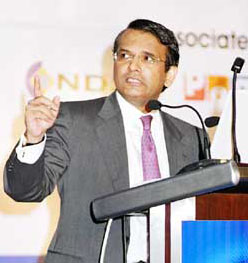For the cable operators in India, there is much to learn from Taiwan. The industry, which was unorganised, has undergone changes: consolidation, network upgradation, and a slow but steady march towards digitalisation. Almost 40 per cent of the national cable TV network is two-way activated.
There is a long way to go though, as the country targets 85 per cent digital television pneetration by 2006. Of a total of 4.2 million paying subscribers, there are less than 125,000 true digital customers in Taiwan.
Eastern Multimedia Company (EMC) Ltd, Taiwan's largest cable TV operator with 1.04 million subscribers through its 13 majority-owned local system operators (SOs), is leading the way in the digital drive. It provides over 100 analogue channels and it is accelerating deployment of its digital platform. The company has invested NT$ 6 billion to upgrade its network to 750 MHz and make it two-way enabled.
EMC chairman Faizal N Syed says the multi system operators (MSOs) in Taiwan control the pipe from the digital headend to the subscribers, encouraging capital infusion into cable companies. Also an international equity investor as the managing director of AIDEC Management Company Pte Ltd (which manages a US$400 million private equity fund), he has broad oversight of regional investments in capital intensive projects in the media, telecom, water, power and transportation sectors. He has experience in international mergers and acquisitions as an advisor and has also worked at JP Morgan Securities as a banker to numerous Indian and South East Asian clients.
In an interview with Indiantelevision.com's Sibabrata Das, Syed talks about how crucial it is for the MSOs in India to control the cable TV distribution pipe end-to-end if they are to attract big investments. Taiwan has also allowed 60 per cent foreign investments, creating a healthy corporate governance environment.
Excerpts:
|
Despite a drive towards digitalisation of cable TV, why has the progress been slow in Taiwan? |
||
|
What made the cable industry in Taiwan invest more than Indian companies? |
||
|
What helped the MSOs in Taiwan to consolidate and modernise their operations? |
||
|
How then has Taiwan prevented the emergence of cable monopolies? |
||
|
Are MSOs investing on network upgradation to make it two-way enabled? |
||
|
||
|
Does Taiwan have a rate regulation system like we have in India? |
||
| How has that affected the industry? Prices on cable are very sticky. They don't go up. Customers are spoilt because they get more channels but the price umbrella is very low. Niche services are costly. And delivery on those pipes cost money. The challenge for cable operators is how to provide additional services at a reasonable price. |
||
|
Is payout to broadcasters a big issue? |
||
|
What are the digital plans for EMC? |
||
|
Are cable companies able to grow broadband subscribers? |
||
|
Chunghwa Telecom, the nation's biggest phone company, has started delivering TV signals over its high-speed Internet links in an effort to tap into the digital broadcasting sector. How do you see competition emerging from telecom companies? |







